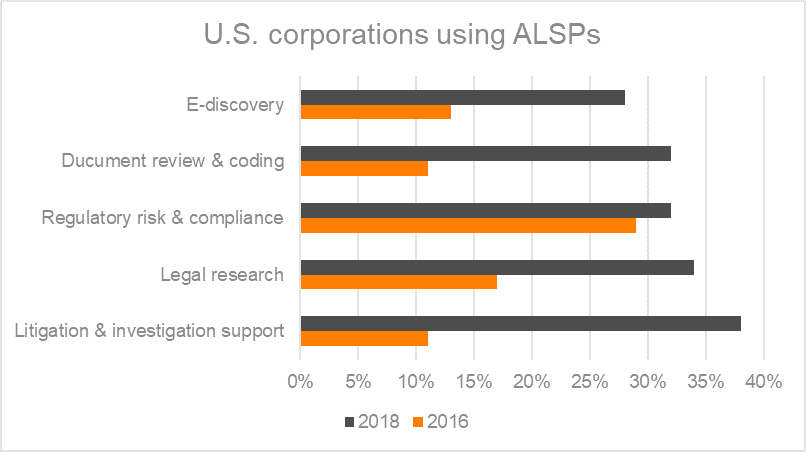A recent survey of client-nominated standout lawyers revealed some interesting insights about legal work in a post-COVID-19 world. These lawyers want greater flexibility, meaningful technology investments, and more streamlined processes that make digital work easier. These lawyers have also expressed few reservations about leaving if their current firm is not meeting these expectations.
For law firms trying to gain or preserve a competitive advantage, this is critical knowledge. Talent, alongside technology, process, culture, and strategy are also important components to an effective competitive advantage. With so much disruption across the legal industry, the stakes are higher than ever. Firms with a cohesive, forward-thinking competitive strategy stand to gain tremendously over the coming months.
Who exactly are your competitors?
As the legal market evolves and clients become more likely to unbundle their legal work, firms must recognize that “competitors” are no longer just peer firms. Large law firms are seeing increasing competition from medium-size rivals offering lower rates and AFAs as a strategy for taking market share.
Likewise, alternative legal service providers (ALSPs) have begun delivering pieces of the legal services firms would otherwise provide. A 2019 survey indicated that 38% of corporations now use ALSPs for litigation & investigation support, 34% for legal research services, 32% for regulatory risk & compliance services, 32% for document review & coding services, and 28% for e-discovery services. In fact, corporate use of many of these services doubled between 2016 and 2018.

And though the very nature of legal services encourages clients to shop around, the best firms succeed by offering something their clients can’t get anywhere else. In years past, this kind of differentiation was largely qualitative. Firm reputation, talent, and promises of superior client service attracted many clients who were comfortable with the standard billable hour as the going rate for these intangible assets.
Clients have changed
Today’s legal client is much more concerned with quantitative measures. In fact, more than 40 percent of surveyed chief legal officers say they’ve moved a portfolio of work to a different firm for lower fees (Altman Weil. 2019 Chief Legal Officer Survey). It’s safe to assume this trend has been exacerbated by the events of 2020.
As clients push for increased clarity, law firms’ ability to respond in kind is key. Increasingly, clients demand that firms provide clear budgets, stick to them, and scope future services on a portfolio level rather than matter by matter. In support of these requests, they are also asking questions about the firm’s use of legal technology to deliver on these promises and basing their decisions on the responses.
Clients have begun viewing their outside counsel as legal businesses – partners and vendors whose charge is to demonstrate increasing value for the cost. These expectations increase competition and make differentiation more difficult. But in today’s legal market, standing out from your competitors may well be the difference between success and failure. The firms thriving in five years will be those who have crafted and executed a comprehensive competitive strategy. Firms only “getting by” will see their practices and revenues shrink in a market where competition is increasing.
Time to strategize
As the world transitions into this new normal, the entire legal industry is rethinking its approach. Your clients want innovative solutions and your competitors are racing to deliver. But firms in this reactive posture, pursuing knee-jerk solutions without long-term strategies, won’t win in the end. Instead, take the time to examine your market, clients, and competitors. A deeper look will reveal gaps and opportunities other firms may miss. We’ll discuss some macro trends that can give you a good start in our next blog.







